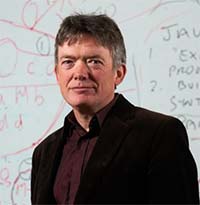Thursday, 22 February 2024

Prof Thomas Leo McCluskey - Artificial Intelligence
This talk was purposely called, A Boffin's View of Artificial Intelligence.
Professor McCluskey was very keen to avoid any sensationalism by having a neutral-style title. He wanted his audience to make up its own mind about what the future of Artificial Intelligence might be like.
He set the right tone, before he began speaking, by showing a short video of robots playing football. We laughed at the antics of these machines with some people, in the audience, muttering unflatteringly about their local teams or even the England squad. He also explained, to infectious laughter, the difference between Artificial Insemination and Artificial Intelligence. Any farmers were invited to stay for the talk even if they had come expecting something entirely different.
 He presented himself as the knowledgeable voice of reason. We found he was an academic who knew the subject from the inside, but someone who could communicate difficult ideas in an easy-to-understand fashion. In this way, he won our trust quickly.
He presented himself as the knowledgeable voice of reason. We found he was an academic who knew the subject from the inside, but someone who could communicate difficult ideas in an easy-to-understand fashion. In this way, he won our trust quickly.
Thankfully, for the non-scientists present, his talk was well structured with the main take-home points advertised prominently at the beginning. He even warned us, in a tongue-in-cheek fashion, when the talk would take a more technical turn and we might nod off. That was alright, he assured us, if we woke up for the concluding remarks.
Contrary to much of the hype in the press of or television, we learned that AI is not set to take over the world. That AI will not become conscious like human beings. It was, he acknowledged, possible for AI to do damage via viruses, cyber-attacks and deep fake entities, but with properly written software and well-applied regulations it is not beyond our capabilities, he ventured, to tackle these threats.
Professor McCluskey qualified his reassuring messages about the benefits of AI with, 'I might be wrong, but it will not be due to ignorance.' Some people who came to the talk with worries about the future having listened to the pundits in the media, left feeling more confident that things were not as bleak as they imagined.
Also helpful was the answer by ChatGPT to the professor's question, 'Did you eat my hamster?' The answer was, 'I don't have the physical capabilities or the abilities to interact with the real world, so I definitely did not eat your hamster or anything else for that matter.' That was a reassuring answer because it proved that there are limits to AI's influence in the real world, especially heartening for small mammals.
Understandably, some of the audience left feeling still worried about the regulations needed. We were satisfied that, with academics like Professor McCluskey working on our behalf, the use of AI in the future would be well managed, but there were, as he acknowledged, so many 'cowboys' out there capable of producing flawed software and since, 'software is the most complex artefact known to man,' many wondered whether there are enough people who know what they are doing to ensure a bright future? Moreover, he asked us to consider, whether we are educating enough students for an AI future?
The questions after the talk seemed to contain many of these reservations with issues raised about military usage, AI and the arts, the funds needed in a cost-of-living crisis, and what might AI usage be like in ten years' time? That last point, and the Professor's reluctance to even stab at an answer, caused general, but good humoured, laughter.
Since AI capabilities are changing with great rapidity it became obvious that we need him back, at regular intervals, to keep us in touch with developments in this vitally important subject.
Our last talk until September, is on Saturday March 9th. It is given by Professor Matthew Cobb, who will tell us why it took scientists 200 years to decided exactly how babies were formed. It will be a fascinating talk given by an academic and media (R4) expert.
Many thanks to Roger Gill for this report
The Lit & Sci website
More Lit & Sci coverage from the HebWeb

